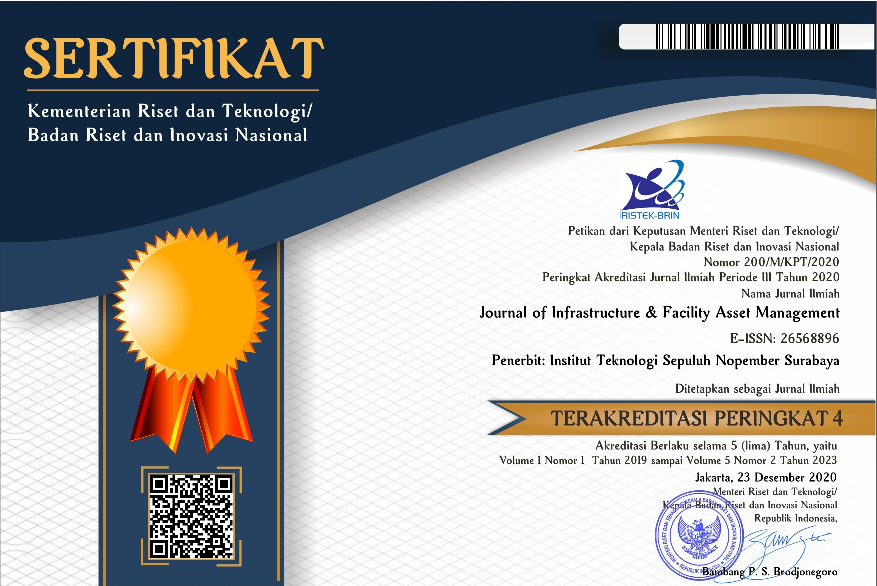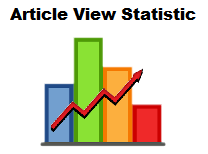Management Model of Mambal Irrigation Area in the Efforts to Develop Environment-Based Agro-tourism
Abstract
Bali has an irrigation system known as Subak. The utilization and operation of Subak, are carried out by involving community participation in it. Mambal Irrigation Area, having great water potential, can still be developed to increase agricultural yields in the Mambal Irrigation Area. The purpose of this research was to determine the management model of the Mambal Irrigation Area to develop agro-tourism with environment-based. The SWOT model, based on the potential and problems that occur in the Mambal Irrigation Area, is used. Based on the location survey and SWOT analysis, the results obtained are the strength of the Mambal Potential water in the Mambal weir can flow during the dry season and rainy season, this potential can be used to increase agricultural yield and develop the area as an agro-tourism environment-based. But on the other hand there are still some problems that occur in the Mambal Irrigation Area. Alternative management, can be done to optimize the existing potential and reduce the negative impact due to existing problems, is by developing environment-based agro-tourism in the Mambal Irrigation Area. Agro-tourism is expected to reduce the land-use change in the Subak area, improve socio-economic conditions in the surrounding area, and can maintain the environmental sustainability.
Full Text:
PDFReferences
Bali Government (2012) Peraturan Daerah Provinsi Bali Nomor 9 Tahun 2012. Indonesia. Available at: https://jdih.baliprov.go.id/produk-hukum/peraturan/20404.
CV. Amertha Nirwana (2018) Preliminary Report on Inventory and Condition of Irrigation Networks in the Tukad Ayung River Basin in the Province of Bali. Denpasar.
Harini, R., H.S. Yunus., Kasto, & S. H. (2013) ‘Agricultural Land Conversion: Determinants and Impact for Food Sufficiency in Sleman Regency’, Indonesian Journal of Geography, 44(2), pp. 120–133. DOI: 10.22146/indo.j.geog,2394.
Herawati, N. (2015) ‘Pengembangan Pariwisata Berkelanjutan Berbasis Subak Sebagai Bagian Warisan Budaya Dunia Unesco di Desa Mengesta Kabupaten Tabanan’, Jurnal Master Pariwisata (JUMPA), 2(1), pp. 79–103. DOI: 10.24843/jumpa.2015.v02.i01.p05.
Joshi, P.V. & Bhujbal, M. B. (2012) ‘Agro-Tourism a Specialized Rural Tourism: Innovative Product of Rural Market’, International Journal of Business and Management Tomorrow, 2(1), pp. 1–12.
Kotler, P. (2000) Marketing Management. Prenhallindo: Jakarta.
Mambal Irrigation Area Dam Observers Office (2018) Map of Subak Mambal. Badung.
Ministry of Culture and Tourism (2011) ‘Nomination for inscriptions on the UNESCO World Heritage List’, in Cultural Landscape of Bali Province. Ministry of Culture and Tourism of the Republic of Indonesia: Jakarta. Available at: http://whc.unesco.org/uploads/nominations/1194rev.pdf.
Moore, S. et al. (2016) Southern California Bight 2013 Regional Monitoring Program: Volume III. Trash and Marine Debris. DOI: 10.13140/RG.2.2.32214.04163.
Riadi, M. (2013) Strength Weakness Opportunities Threats (SWOT), kajianpustaka.com. Available at: http://www.kajianpustaka.com (Accessed: 4 August 2019).
Santosa, I., Adnyana, G., Dinata, I., & Gunadi, I. (2010) ‘Impact of Changing Function of Rice Fields on Utilization of Water Resources to Support Food Security’, Bumi Lestari Journal Of Environment, 10(2), pp. 208–214. Available at: https://ojs.unud.ac.id/index.php/blje/article/view/123/105.
Santosa, I. G. N. (2008) ‘Conservation of Water Resources as the Key to Realize Sustainable Water Use, Food Security and Poverty Alleviation’, in The 5th INWEPF Steering Meeting. Symposium on Efficient and Sustainable Water Use to Address Poverty Alleviation and Food Security. INWEPF Indonesian Committee: Bali, pp. 151–156.
Suprayitno, H. & Soemitro, R. A. . (2018) ‘Preliminary Reflexion on Basic Principle of Infrastructure Asset Management Pemikiran Awal tentang Prinsip Dasar Manajemen Aset Infrastruktur’, Jurnal Manajemen Aset Infrastruktur & Fasilitas, 2(1), pp. 1–10.
Wiguna, I. W. A. A. (2008) The Versatility of the Subak Ecosystem in Tourism Development in Bali. I. Aksara Indonesia: Yogyakarta.
Windia, I. W., & Wiguna, W. A. A. (2013) Subak World Cultural Heritage. Udayana University Press: Denpasar.
DOI: http://dx.doi.org/10.12962%2Fjifam.v2i2.7277
Refbacks
- There are currently no refbacks.
Visitor :
Flag Counter

Journal Of Infrastructure & Facility Asset Management by Institut Teknologi Sepuluh Nopember is licensed under a Creative Commons Attribution-ShareAlike 4.0 International License.





